
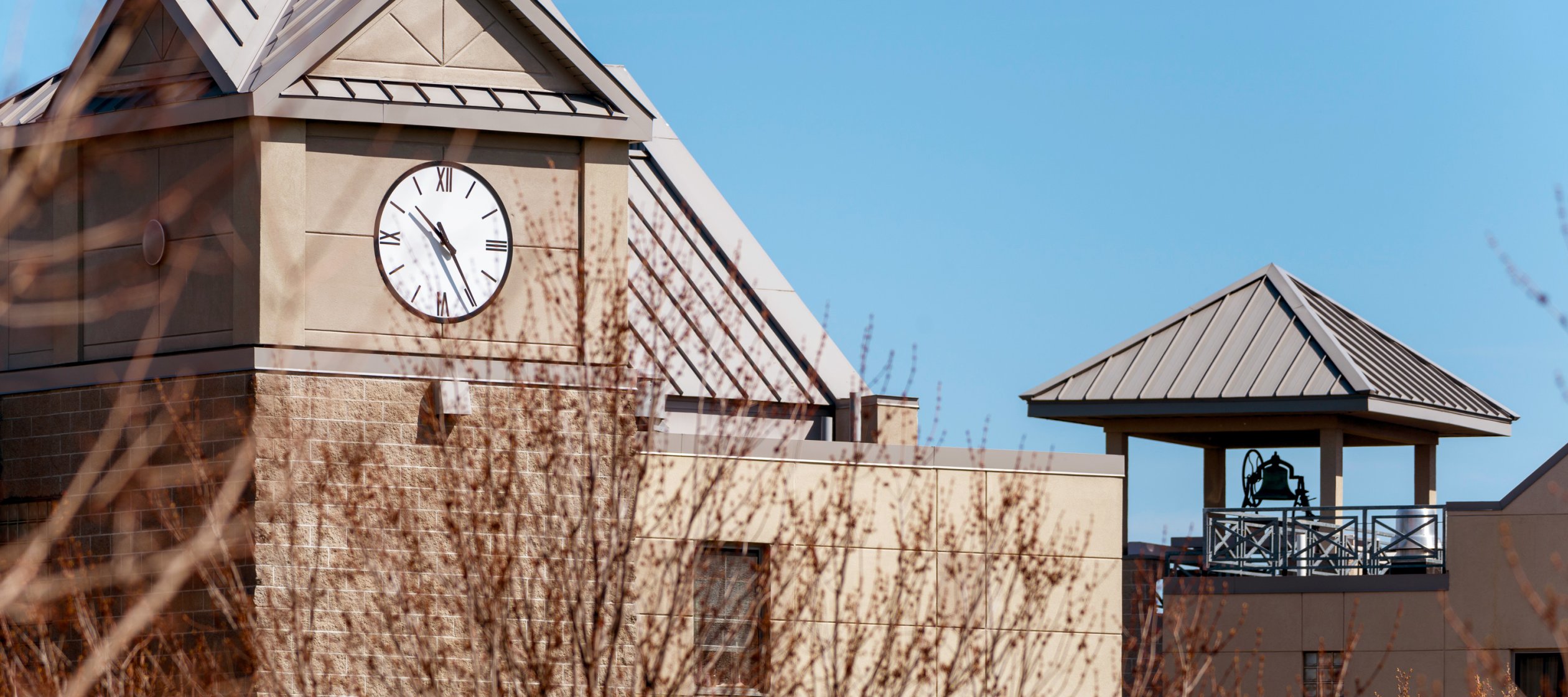
Bias Incident Reporting
The Bias Response and Referral Network (BRRN) helps foster an inclusive climate by creating a space for campus community members to report and receive support after a bias-related incident.
BRRN Committee members meet with incident reporters to collect additional details, connect them with relevant on-campus services such as counseling, and ensure all reports are being handled with care.
The Bias Incident Report Process
After the review process, bias incident reports are either referred to the designated collaborative offices for investigation and/or to the Chief Diversity Officer/Office of DEI and Belonging to facilitate educational programming, conflict mediation, and/or other restorative justice practices as needed. See a full breakdown of the three-phase process below.
Phase 1 of the process addresses what happens immediately following a BRRN report submission. In this phase, the BRRN Committee reviews reports, meets with reporters, and determines the next steps.
- Incident is reported to the Guardian portal.
- Reporter receives an automatic confirmation email with their case number and additional information.
- BRRN Committee members review the case with the reporter and determine the case action. The BRRN Committee meets weekly on Mondays to review reported cases.
In Phase 2, reports are referred to relevant offices for investigation and/or for conflict mediation and educational solutions. BRRN Committee members routinely follow up on ongoing investigations to ensure reports are moving forward.
Cases are referred for intervention or investigation. Intervention and investigative bodies include:
- Office of Campus Safety
- Office of Human Resources
- Office of Student Conduct
- Office of DEI and Belonging
Note: These offices may need to collaborate with other spaces and individuals on campus, such as the Office of the Provost, the Chief Diversity Officer, etc. to conduct a thorough and nuanced investigation. Those involved in the bias reporting process will make every effort to safeguard the identities of Utica
community members who seek help and/or report complaints of bias-related incidents and maintain confidentiality whenever possible, given the University’s
responsibility for supporting a safe and nondiscriminatory working and learning environment. Education and training may be offered even when a case is
referred for formal investigation.
The outcomes are communicated to reporters and the BRRN Committee. Redacted case data is collected and disseminated to the University community in an annual report.
- Outcome communicated to the reporter and the BRRN Committee.
- Annual BRRN case data is reviewed by the Chief Diversity Officer and analyzed for trends.
- The Office of Institutional Effectiveness generates a BRRN Annual Report and disseminates it to the University Community.
- The BRRN Annual Report is uploaded to the Institutional Effectiveness webpage for archival purposes.
The members of the BRRN Committee do not investigate, arbitrate, take disciplinary action, or impose sanctions. The BRRN does not take the place of other Utica University procedures, but rather it supplements and works with appropriate University offices to connect those who have been a target of an act of bias or those who have witnessed such an act with support and resources.
Please note that not all conflicts and incidents are necessarily bias related. Refer to the Types of Incidents section to learn more and see other offices that handle complaints on campus.
The BRRN team evaluates its processes for continual improvement on an annual basis. Suggestions and feedback are welcome and can be sent to diversity@utica.edu.
Not sure where to start?
Not all conflicts have an element of bias, and others may have more specialized investigative offices to better handle the nuance of the situation. Here are other places on campus to report concerns:
Vice President, Marketing and Communications

Vice President for Emergency Management

Director of Student Living

Executive Director, Diversity, Equity, and Inclusion

Communications and Engagement Coordinator, Diversity, Equity, and Inclusion

Complaints involving a member of the BRRN should be reported directly to President Todd Pfannestiel at tjpfanne@utica.edu. Please include the following information:
- Contact information (your name, position/title, email address)
- Details of the Incident (date, time, location, and a description of the incident)
- Involved parties (individual or organization, name/ID, role of party)
- Supporting documentation (please attach to the email)
Utica University is committed to safeguarding the free expression rights of all community members. However, biased and hateful expression can impact individuals and create division and fracture our college community in ways that must be addressed. Because bias-related behaviors frequently involve speech and other forms of expression, we believe it is necessary, and possible, to distinguish such forms of expression from the open and respectful expression of ideas and opinions.
Some points to consider when differentiating bias-related behavior from protected speech and forms of expression include the following:
- Speech and other forms of expression that convey reasoned opinion, principled conviction, political satire, or speculation is not harassment, even though it may challenge people’s perspectives or comfort.
- Speech and consideration of concepts that are pertinent to a class’s subject but which some students may find offensive do not constitute bias-related behavior.
- Claiming that the speech is merely an expression of ideas or opinions is not a justification for behavior when that speech or other form of expression creates an intimidating or hostile environment that unreasonably or substantially interferes with an individual's ability to fully participate in the learning, living, and working opportunities available to all members of the Utica University community.
In essence, bias-related behaviors fall outside the bounds of civil discourse and are not tolerated at Utica University.
At Utica University, you're part of a community committed to the pursuit of knowledge, meaningful academic experiences, and intellectual growth. In order to serve these goals, we recognize that we have a responsibility to create an inclusive community for you, in which all of its members feel valued, as well as an obligation to build a community that affirms, cherishes, and sustains freedom of expression.
Each person is born into different social categories and are influenced by the world around them. Messages from parents or guardians, friends, teachers, medical professionals, the media, and more shape how one views themselves and others.
This socialization often leads to unconscious assumptions and stereotypes, especially about those different from yourself, in the form of bias.¹
Bias alone is not a cause for concern, as many of these assumptions can be unlearned with thoughtful reflection and intentional education. Acting on one’s bias, either due to fear, misunderstanding, hatred, etc., may be deliberately or unintentionally hurtful and ultimately lead to others feeling alienated, attacked, or unwelcome here at Utica University.
According to the Student Code of Conduct, bias-related incidents are:
- Conduct that adversely and unfairly targets an individual or group based on social identity categories. Social identity categories include any combination of the following:
- National origin
- Ethnicity
- Race
- Age
- Religion
- Gender, gender identity & expression
- Sexual orientation
- Disability
- Veteran status
- Color
- Creed
- Marital status
- Speech or other forms of expression intended to harass, threaten, cause fear of physical injury, or otherwise incite violence or other criminal action against an individual or group. The act may be verbal, written or physical and occur on campus or within an area that affects the campus community.
UTICA UNIVERSITY CODE OF STUDENT CONDUCT
Hate crimes are also fueled by bias and prejudice, but are explicitly tied to actions that are against the law. The Federal Bureau of Investigations defines a hate crime as a “criminal offense against a person or property motivated in whole or in part by an offender’s bias against a race, religion, disability, sexual orientation, ethnicity, gender, or gender identity.”
While all hate crimes are bias-related incidents, not all bias-related incidents are hate crimes.
If you feel you have experienced a hate crime, or you feel your safety is at risk and/or there are threats of immediate danger, contact the Office of Campus Safety immediately at (315) 792-3046.
¹Adams, M., Blumenfeld, W. J., Castañeda Carmelita Rosie, Hackman, H. W., Peters, M. L., & Zúñiga Ximena. (2010). Readings for diversity and social justice (2nd ed.). Routledge.
What might bias related behavior look like?
Some examples of bias-related incidents include:
- A person getting intentionally ridiculed for the pronouns they use.
- A person making racially disparaging comments in class.
- A person being verbally harassed for being from another country.
- A person using language related to physical or mental disability to insult someone.
- A person telling someone to expect to struggle due to stereotypes about the person’s race, ethnicity, gender identity and/or other perceived characteristics.
Please note that these examples are not all encompassing. If you believe you have experienced or witnessed a bias-related incident, please report it.
Please note that while it is possible to submit anonymous complaints to the Bias Response and Referral Network, it is difficult for designated investigators to fully review anonymously reported incidents due to the absence of adequate evidence or context normally gathered through the complainant review process.
Similarly, those who report anonymously will not receive a final report regarding their complaint nor be kept in the loop on any updates to the investigation due to the lack of contact information. Therefore, we strongly encourage you to include your name when filing a bias incident report.
Anonymous reports will still provide a record that may assist officers in resolving other cases, and will also assist the BRRN in keeping a more accurate record of bias-related acts that occur in our community.
How do I know if what I experienced is a bias incident?
Often, our gut feeling or instinct tells us that we have experienced bias. Talking it over with trusted colleagues, friends, family, or others may help you determine whether or not the incident was based on bias toward you. Educating yourself about bias can help as well.
Some examples of bias-related incidents include:
- A person getting intentionally ridiculed for the pronouns they use.
- A person making racially disparaging comments in class.
- A person being verbally harassed for being from another country.
- A person using language related to physical or mental disability to insult someone.
- A person telling someone to expect to struggle due to stereotypes about the person’s race, ethnicity, gender identity and/or other perceived characteristics.
Please note that these examples are not all encompassing. If you believe you have experienced or witnessed a bias-related incident, please report it.
What about free speech? Are you trying to stop free speech or limit academic freedom? How are bias-related behaviors different from “protected” free speech?
The BRRN is committed to fostering robust and respectful dialogue within our college community, in accordance with Utica University’s Statement of Principles Regarding Expression.
The team does not tell members of the campus community what they can or cannot do or say. The team also does not have any role in investigating or disciplining any community members for their speech or expression. Rather, the BRRN’s aim is to provide resources and support for members of the campus community who have been harmed by bias incidents, including those that may have stemmed from protected free speech; affirm the University’s values of equity, diversity, and free expression; and support the creation of spaces for more speech and dialogue around issues of social identity that affect our campus community.
What happens when I report a bias-related incident?
After submitting your report, a member of the BRRN will let you know your report has been received, provide options for action, talk with you about your preferred response, and provide resources for support. If a bias-related incident targets a group or particular community, rather than a specific individual, a member of the team will contact representatives of that community to discuss possible actions in response to the incident.
Such actions may include making a referral for investigation and conduct action through investigative offices as appropriate, such as the Office of Campus Safety, the Office of Student Conduct and Community Standards, the Office of Student Affairs, the Office of Humans Resources, the Office of Legal Affairs and General Counsel, or local law enforcement. Incidents that are potentially Title IX related will be referred to the Title IX Coordinator for review and investigation as appropriate.
Other kinds of action, such as passive or active programming about bias-related acts and hate crime, facilitating meetings among those who engaged in the behavior and those who have been targeted and affected, will be discussed and arranged on a case-by-case basis.
If the incident I report goes through a conduct process, will I receive information about what happens as a result?
The Family Educational Rights and Privacy Act (FERPA) prevents anyone employed by the University from divulging information about a student, including the results of disciplinary process, without his or her authorization. You may be aware that there has been a response to your report through the conduct process, but will not be informed about the outcome. In cases that involve acts of violence, fuller disclosure is allowed to the victim of the violence.
There are similar restrictions for conduct action that involve employees of the University, whether they are faculty or administrative staff.
If I submit a report about someone specifically, will they learn it’s from me?
The BRRN will make every effort to safeguard the identities of Utica community members who seek help and/or report complaints of bias-related incidents and maintain confidentiality whenever possible, given the University’s responsibility for supporting a safe and nondiscriminatory working and learning environment.
While steps are taken to protect the privacy of all involved, the University may need to investigate an incident and take action once it knows about an incident, whether or not the person making the report chooses to pursue a formal complaint through the University’s conduct processes or law enforcement.
You do have the option to report anonymously if you wish. However, if you choose to remain anonymous, our ability to respond to a reported incident is likely to be limited. We will, however, track anonymous reports in order to keep a more accurate record of bias-related acts that occur in our community.
Am I protected against retaliation?
Any person who files a bias-related incident report in good faith, who serves as a witness during a related investigation, or who otherwise supports the report, is protected against retaliation. You have the right to report what you believe is a bias-related incident or hate crime without fear of retaliation.
Retaliation includes intimidation, threats, harassment, and other adverse action based on your having filed a bias-related incident report. When evidence of retaliatory behavior exists, appropriate disciplinary action will be taken.
If you believe you have been subjected to retaliatory behavior, please contact the Director of Student Conduct and Community Standards (if a student) or the Vice President for Human Resources (if an employee) immediately.
What happens if someone submits a false report?
If in the process of responding to a bias-incident related report we find that the report was not made in good faith – that it was knowingly false or filed with malicious intent – the person filing the report may be subject to disciplinary action.
Can I talk with someone confidentially for support before filing a report?
We know that those who have been involved in or witnessed bias-related behaviors may need emotional or medical support. Confidential resources do exist on campus at Utica University that can also help you decide on the actions you wish to take.
A student seeking confidential emotional or medical care may contact the following:
Student Counseling Center
Student Wellness Center, Room 204 Strebel Student Center
(315) 792-3094
Student Health Center
Student Wellness Center, Room 204 Strebel Student Center
(315) 792-3094
The health and counseling services noted above are available to Utica University students free of charge.
An employee seeking confidential emotional support may contact the University’s employee assistance program, NexGen EAP, at 1-800-EAP-CALL (1-800-327-2255).
Any information provided to these resources will not be reported to other University officials in any personally identifiable manner. As a result, any individual making a report solely to such confidential resources should not expect formal action to be taken by the University.
I feel like negative things like microaggressions happen all the time. What’s the point of reporting them?
Although microaggressions occur often, each one has an impact on the individual, and they have a cumulative effect on both individuals and communities. Reporting microaggressions helps tremendously in combating bias.
The more information we have about microaggressions at Utica University (e.g., who engaged in the behavior, the identity targeted, where the incident occurred), the better the BRRN and other offices can focus educational programs, outreach efforts, and responses.
Is there a law that prohibits this behavior?
While not all bias-related behavior is criminal in nature, there is legislation such as the NYS Hate Crimes Act of 2000 and the Clery Act that are related to defining, tracking, and educating about biases and hate crimes.
Do I have to report a single individual? Can a group be considered to have engaged in bias-related behavior?
Members of a student group, team, office, or organization could act in a way that is motivated by bias. Such actions, if reported, would be addressed, although the process may differ from that of holding an individual responsible for their conduct.
Why is the BRRN needed at Utica University?
Bias-related incidents can, and have, happen at Utica University. These incidents undermine the University’s efforts toward equity and inclusivity and cause distress and harm to those who experience them. Bias incidents limit the ability of members of our community to excel in our work and learning. Utica University has an obligation to address bias, and the BRRN provides a consultative and consistent way to do so.
Below are the categories used to report bias related incidents. Please note that the categories vary in severity. In some instances, it will be appropriate to report the incident directly to Campus Safety. Those will be noted.
Discrimination
Discrimination is conduct that involves inequitable treatment of a person based on that individual’s actual or perceived social identity(ies) that violate New York State’s Human Rights Law and other federal legislation.
The University reserves the right to discipline offensive conduct that is inconsistent with community standards, even if it does not rise to the level as defined by applicable law.
General Concern
Do you feel like you experienced bias, but aren’t sure what category it might fit in? The BRRN also takes reports for general concerns.
When you meet with the BRRN members or campus investigators, they will talk you through the incident and will be able to help you better understand exactly what happened and how to classify your experience.
Graffiti or Vandalism
These incidents should be reported directly to the Office of Campus Safety immediately. Please call the office at (315) 792-3046.
Graffiti is “the etching, painting, covering, drawing upon or otherwise placing of a mark upon public or private property with intent to damage such property.” (NYS Penal Law 145.60)
Do not erase or clean off the graffiti. Contact the Office of Campus Safety immediately. An officer will take photographs and/or record the contents of the graffiti, as well as collect any other evidence available.
If you cannot remain at the scene until a Campus Safety officer arrives, cover any graffiti/evidence with a piece of paper. Write on the paper that the Office of Campus Safety was called and give the date and time of your call. This will prevent others from seeing it and making additional calls or erasing the evidence.
If you are told by someone that they have seen bias-related graffiti, you or the person who told you should contact the Office of Campus Safety. Even if you are told that the evidence of this graffiti has been cleaned or erased, contact the Office of Campus Safety and provide as much information as you have about the time and place the graffiti was seen.
Vandalism, also referred to as criminal mischief in New York State, is “intentionally damaging the property of another person.” (NYS Penal Law 145.1)
Do not attempt to clean or repair the damage.
Contact the Office of Campus Safety immediately for an officer to collect evidence and record the damage. The Office of Campus Safety and/or the Office of Student Living and Campus Engagement may contact an emergency maintenance staff member if the damage makes a structure unsafe.
Harassment
Harassment occurs when someone “intentionally and repeatedly harasses another person by following such person in or about a public place or places, or by engaging in a course of conduct or by repeatedly committing acts which places such person in reasonable fear of physical injury.” (NYS Penal Law 240.25)
This conduct is sufficiently severe, pervasive, or persistent to the point of interfering with the ability of another person to participate in or benefit from the services, activities or privileges provided by Utica University, or has the purpose of creating an intimidating or hostile environment. That conduct may be physical, verbal, graphic, written, or electronic in nature.
Harassment is not limited to the categories listed above, and may include obscene or threatening behavior and/or verbal abuse.
The University reserves the right to discipline offensive conduct that is inconsistent with community standards, even if it does not rise to the level as defined by applicable law.
Microaggression
Microaggressions are the everyday verbal, nonverbal, and environmental slights, snubs, or insults, whether intentional or unintentional, which communicate hostile, derogatory, or negative messages to target persons based solely upon their marginalized group membership or identity.
It is important to note that those who inflict microaggressions are often unaware that they have done anything to the other person or people.
Cumulatively, microaggressions have the potential to create a “chilly climate” in which members of a group feel marginalized or unwelcome based on their identity. Repeated acts of microaggression could constitute harassment and be grounds for conduct action.
Physical Attack
These incidents should be reported directly to the Office of Campus Safety immediately. Please call the office at (315) 792-3046.
Contact the Office of Campus Safety immediately or dial 911 if medical attention is needed. The Office of Campus Safety will assist you with how to proceed.
If you are reporting a physical attack after time has passed, and there are no immediate safety concerns, the Office of Campus Safety is still the best place to make this report, although you can also utilize the online reporting form from the BRRN.
Threat of Violence
These incidents should be reported directly to the Office of Campus Safety immediately. Please call the office at (315) 792-3046.
Students should contact the Office of Campus Safety immediately and provide detailed descriptions of what happened, what was said, who was involved, and where it occurred. Be sure to include names of any witnesses. Campus Safety officers will work with you on ensuring your safety and talk with you about next steps.
Employees should also contact the Office of Campus Safety if there is an immediate threat of danger. If there is no immediate threat, please contact the Office of Human Resources. The Office of Human Resources will begin the process of investigating the incident and will work with you to determine if additional parties need to be involved (e.g. the Office of Campus Safety, law enforcement, etc.).
Other Incidents
Not all conflicts have an element of bias, and others may have more specialized investigative offices to better handle the nuance of the situation. Here are other places on campus to report concerns:
Student Conduct
The Office of Student Conduct and Community Standards investigates general inappropriate behavior and incidents that go against the Student Code of Conduct.
Title IX
"No person in the U.S. shall, on the basis of sex be excluded from participation in, or denied the benefits of, or be subjected to discrimination under any educational program or activity receiving federal aid."
Examples of the types of conduct that violates Title IX include, but are not limited to:
- sexual harassment and sexual misconduct (includes sexual assault, domestic violence, dating violence, and stalking)
- discrimination on the basis of sex in all student services and academic programs. This includes areas such as admissions, financial aid, academic advising, residence life and housing, health services, counseling, registration, and activities related to classroom requirements (such as class projects, grading, etc.)
- discrimination on the basis of sex in terms of employment and recruitment consideration or selection
- failure to provide equal opportunity in athletics
Human Resources
The Office of Human Resources serves dedicated faculty and staff, who are committed to the mission of the University. They investigate grievance complaints regarding faculty, staff, and third-party vendors of the institution.
Campus Safety
The Utica University Office of Campus Safety is dedicated to ensuring the personal safety and well-being of Utica University's students, employees, and guests. Officers are available 24 hours a day by calling x3046 (campus phones) or (315) 792-3046 (cell and off-campus).
Bias-related incidents can be very upsetting to not only the targeted person but also to the whole community. There are many offices at Utica University that can help by providing support to individuals or by providing access to community-based educational programs.
Resources for students:
Student Counseling Services: Strebel Student Center Room 204 | (315) 792-3094
Division of Diversity, Equity, and Inclusion and Student Transitions: White Hall Room 121 | (315) 792-3101
The Office of Student Affairs: Strebel Student Center Room 103 | (315) 792-3100
Office of Student Conduct and Community Standards: Strebel Student Center Room 105 | (315) 792-3363
Office of Campus Safety: Strebel Student Center, accessible via the quad | (315) 792-3046
Resources for employees:
Office of Human Resources: White Hall Room 104 | (315) 792-3276
NexGen Employee Assistance Program: 1-800-327-2255
Division of Diversity, Equity, and Inclusion and Student Transitions: White Hall Room 121 | (315) 792-3101
Office of Campus Safety: Strebel Student Center, accessible via the quad | (315) 792-3046
Contact Us
Anthony Baird

Anthony Baird
Vice President for Diversity, Equity and Inclusion and Student Transitions
(315) 792-3310

Non-Discrimination
Utica University is an equal opportunity, affirmative action institution, and accepts students and employs individuals without regard to race, creed, color, sex, pregnancy, ethnic or national origin, religion, marital status, age, sexual orientation, gender identity, gender expression, veteran status, disability, citizenship status, genetic predisposition, domestic violence victim status, or protected status under applicable local, state, or federal law.
UTICA NON-DISCRIMINATION STATEMENT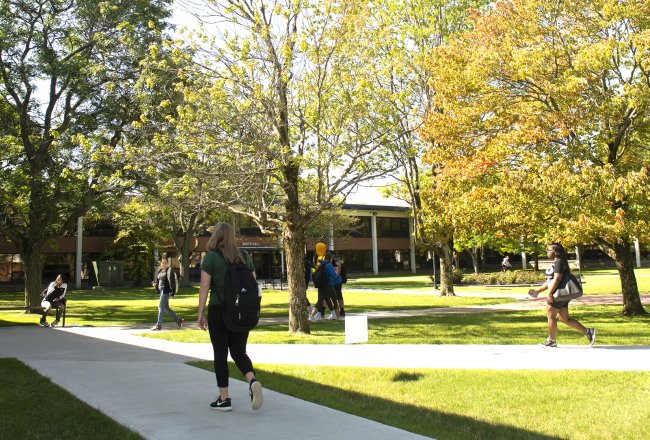
Sexual Harassment, Gender-Based Harassment, and Sexual Misconduct
Utica University is committed to providing a learning and working environment in which all interpersonal relationships are based upon respect and dignity. In accordance with Title IX of the Education Amendments Act of 1972 (Title IX) and the Violence Against Women Act, Utica College will not tolerate sexual or gender-based discrimination or harassment in any form.
Sexual Harassment, Gender-Based Harassment, and Sexual Misconduct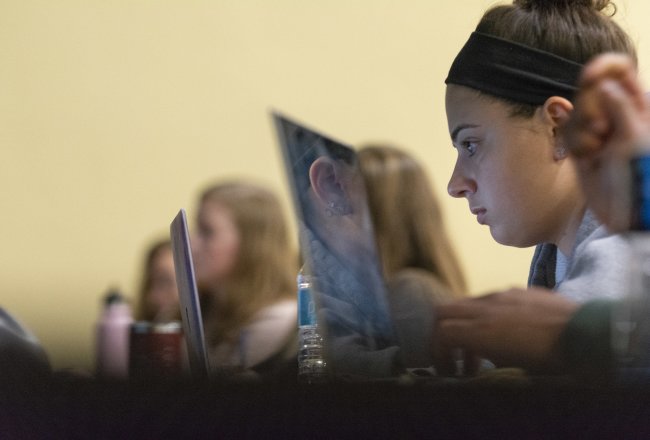
Code of Student Conduct
The Utica University Code of Student Conduct details what is expected of you as a member of the Utica University community. In brief, we expect that you will abide by University policies, rules, and regulations; act responsibly and respectfully in your relationships and interactions with others; act with integrity in your academic work and as you participate in other activities; and obey all local, state and federal laws.
STUDENT CODE OF CONDUCT
Utica University Values
Utica University's mission rests upon a foundation of values that guide the University community's decisions and actions, including, but not limited to, individual attention for our students, lifelong learning, pragmatic approaches to teaching and learning, continual improvement in our educational and operational quality, and diversity of perspective, background, and experience in an increasingly global society.
UTICA UNIVERSITY MISSION AND VALUES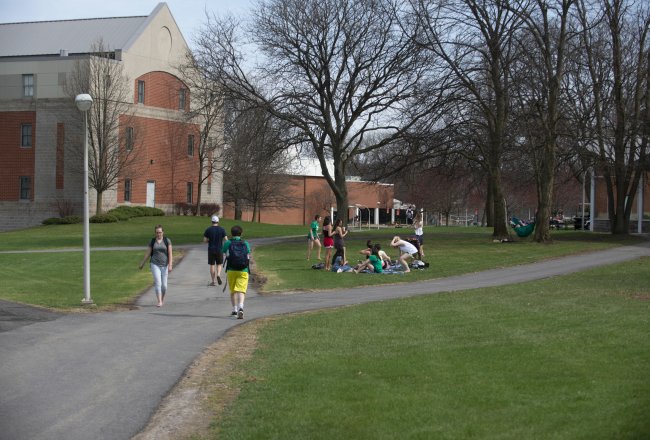
Student Conduct Process
When an incident is documented, reports are forwarded to the Office of Student Conduct & Community Standards. If there is determination that a violation of the Code of Student Conduct has occurred, a charge letter to the student(s) involved is generated. The student charged with the violation(s) will be referred to either a Residence Life Administrator or the Director of Student Conduct. The hearing officer to which the student is referred is based on a student's conduct history and the severity of the alleged violation. A hearing will proceed to determine the responsibility of the student.
The Student Conduct Process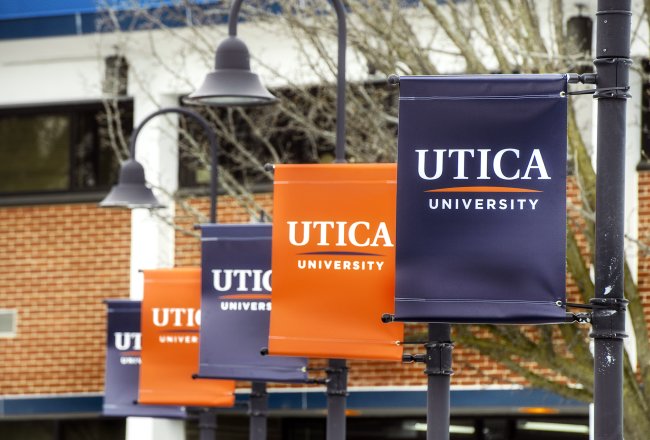
Employee Code of Conduct
Utica University employees are expected to conduct themselves ethically, honestly, and with integrity in all dealings. They need to be fair and principled in their official interactions both within and outside the Utica College community. They must act with due recognition of their position of trust and loyalty with respect to the College and its students, fellow employees, research sponsors, and donors.
Employee Code of ConductWeb Resources for support or ideas for taking action
Bias Incidents and Microaggressions
Be an Ally
Local and National Organizations
Local Organizations
National Organizations

I would like to see logins and resources for:
For a general list of frequently used logins, you can also visit our logins page.
